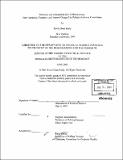Influence and information in U.S. bureaucracy : how agencies, congress, and interest groups use federal advisory committees
Author(s)
Karty, Kevin Dean, 1973-
DownloadFull printable version (24.37Mb)
Alternative title
Influence and information in United States bureaucracy
Other Contributors
Massachusetts Institute of Technology. Dept. of Political Science.
Advisor
Stephen Ansolabehere.
Terms of use
Metadata
Show full item recordAbstract
This thesis studies how government in the US gathers and uses information effectively, and the role of federal advisory committees therein. All governments that serve the public interest encounter conflicting needs - on the one hand to gather information to solve important problems, and on the other hand to resist particularistic pressures of special interests both within and outside of government. Many governments choose to reconcile these demands in different ways - through balance of power, direct oversight, and procedural controls, for example - but these control mechanisms are costly. The use of such control mechanisms impacts both the effectiveness of advisory committees as information gathering tools, and how advisory committees are used. The body of the thesis consists of three papers. The first summarizes the available literature on information transmission and influence in complex environments, especially as they relate to delegation of authority. It categorizes the various bodies of theory and identifies the key lines of difference across these theories. The second paper tests hypotheses about meeting closure, government capture, and committee authorization to ascertain which branches of government are most vulnerable to inappropriate influence. Results weakly predict that committees formed cooperatively by Congress and agencies are most vulnerable to special interests. The third paper uses survey data to test how process controls impact the effectiveness of committees, (cont.) and concludes that although openness does impair committee effectiveness somewhat, balanced membership strongly enhances effectiveness. To explain this apparent contradiction, it notes how balance requirements and other procedural controls enhance a committee's credibility, and reduce the likelihood that important information is dismissed as 'Cheap Talk'.
Description
Thesis (Ph. D.)--Massachusetts Institute of Technology, Dept. of Political Science, 2001. Includes bibliographical references (p. 205-217).
Date issued
2001Department
Massachusetts Institute of Technology. Department of Political SciencePublisher
Massachusetts Institute of Technology
Keywords
Political Science.